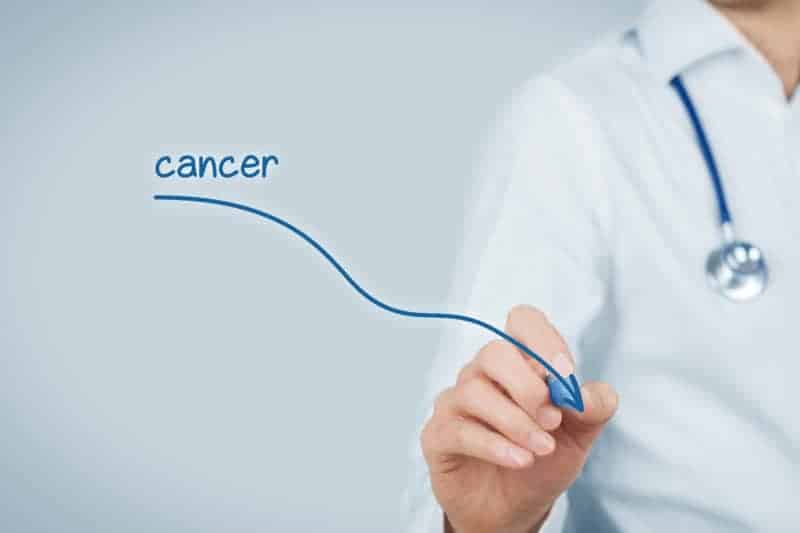Cancer is one of the leading causes of death not only in the United States but around the world. Each year 14.1 million people are diagnosed with some form of cancer while 8.2 million people die from this devastating disease.
These statistics mean it’s highly likely you or someone you know will be diagnosed with cancer in your lifetime. Though these are unpleasant statistics, there is a silver lining to this gloomy cloud. Contrary to what you may have been told, only 5-10% of cancers cases are hereditary, which means 90-95% of cancer cases are dependent on your environment and lifestyle factors.
So, you have the power to prevent cancer.
What Are the Causes of Cancer? Are You at Risk?
A small percentage of cancer is dependent on your genes. But the majority of cancers are rely on certain environment and lifestyle factors, which include:
- Tobacco and alcohol use
- Diet
- Sun exposure
- Environmental pollutants/toxin exposure
- Infections
- Stress
- Inflammation
- Physical inactivity and obesity
9 Ways to Naturally Reduce The Risk of Cancer
If the majority of cancer stem from certain environmental and lifestyle factors, this means you can have a personal hand in decreasing your risk for cancer. Incorporating the following 9 steps to reduce your risk of cancer can have a profound influence on cancer development.
1. Reduce toxic exposure
Avoiding all toxins is quite impossible in today’s world. But, if you can reduce your exposure and reduce your toxic burden, you can also reduce your risk of cancer. Cancer-causing toxins can be found in places you might not have considered, such as your drinking water, food, cleaning supplies, personal hygiene products, air fresheners, and candles, for example.
The National Toxicology Program annually releases a list of carcinogen agents, substances, and mixtures known to cause cancer in humans. In 2016, the list included 248 carcinogens. Now, it’s usually not possible to avoid all 248 agents 100% of the time, but eliminating these top ones can help you decrease your risk of cancer:
- Polychlorinated biphenyls (PCB’s)
- Pesticides
- Dioxins
- Chloroform
- Heavy metals
- Artificial sweeteners, flavorings, and colorings
- Carrageenan
- Acrylamide
- Sodium Benzoate
Go green and organic whenever you can to avoid these harmful toxins. Using a water filter can also help reduce toxins in your drinking water at home.
2. Eat antioxidant foods
Talking about all those toxins is enough to make anyone want to get in a good detox. Your body has its own natural detoxifying process, but when you have an overload of toxins in your body it becomes weak.
The following antioxidant foods help eliminate the free radical toxins in your body, protect your DNA structures, and prevent tumor formation and growth:
- Leafy green vegetables (especially cilantro)
- Cruciferous vegetables (especially broccoli)
- Berries
- Oranges
- Beans
- Apples
- Ginger
- Pecans
- Artichokes
- Tomatoes
3. Avoid tobacco and alcohol abuse
Tobacco and alcohol are two of the biggest lifestyle habits contributing to bad health and cancer. The effects of tobacco and alcohol can lead to damaging your DNA causing any of the following types of cancers:
- Lung
- Larynx
- Mouth
- Esophagus
- Throat
- Bladder
- Kidney
- Breast
- Liver
- Oropharynx
- Stomach
- Pancreas
- Colon
- Rectum
- Cervix
That’s a long list of cancers you can easily prevent by avoiding tobacco and reducing alcohol.
4. Maintain a healthy weight
Obesity is responsible for about 20% of malignancy in cancer patients. Reports show that obesity can be linked to the following cancers:
- Endometrial
- Esophageal adenocarcinoma
- Colorectal
- Postmenopausal breast
- Prostate
- Renal
The release of certain hormones and inflammatory cytokines such as insulin, growth hormones, sex hormones, and adipokines contribute to the growth of cancer cells in your body.
Staying active and eating healthy are two ways to help you maintain a healthy weight and reduce your cancer risk factors.
5. Choose the right foods
This topic goes hand in hand with avoiding toxins and maintaining a healthy weight. Since the foods you eat are a direct representation of your health, eating organic foods is important. Also, eating whole, unprocessed foods can help you avoid not only toxins but help you maintain a healthy weight.
The fasting-mimicking diet, which was created by Dr. Valter Longo, has shown outstanding results of starving off cancer cells. Since this diet is “fasting-mimicking” it doesn’t mean you’ll be giving up food, but it promotes a fasting state in your body with the provided healthy prepackaged foods. Prolonged fasting reduces pro-growth signaling in cells and activates cellular protection mechanisms to reduce tumor growth. This is not a fad diet, but a scientifically proven diet to help reduce cancer risks, and help reduce risk from many other chronic diseases, such as autoimmune diseases.
6. Reduce chronic infections and inflammation
These sources have been linked to the progression of cancer. Inflammatory cells such as chemokines and cytokines can directly affect tumor progression.
These inflammatory cells cause the cancer cells to proliferate by:
- Releasing growth and survival factors
- Promoting growth of blood and lymphatic vessels
- Stimulating DNA damage
- Remodeling cell walls to allow for invasion
- Coating tumors with receptors to help disseminate cancer cells
- Evading defense mechanisms
Eating the following high anti-inflammatory foods can help control inflammation and possibly help prevent cancer:
- Green leafy and cruciferous vegetables
- Coconut oil
- Berries
- Walnuts
- Flaxseeds
- Turmeric
- Ginger
7. Protect your gut with probiotics and fiber
Probiotics specifically containing Lactobacillus and Bifidobacterium have been shown to help fight infections and inflammations such as inflammatory bowel diseases, H.pylori infections, and colon cancer. Probiotics also help to fight the progression of malignancies in your body by blocking tumor growth and metastasis.
8. Limit red and processed meat
Strong evidence shows red and processed meats have been linked to colorectal cancer. Meat can be a valuable source of nutrients, minerals, and protein so completely eliminating it from your diet isn’t necessary.
Limit yourself to less than three portions of red meat per week, ideally 1-2, from organic and grass -fed sources, and try to eliminate all processed meat. Processed meat is typically loaded with hormones, GMOs, and toxic chemicals which can contribute to cancer as well.
9. Easy on the sunscreen
People spend a whopping 90% of their time indoors and as a result, we’re seeing a major vitamin D deficiency across the country. You need vitamin D for the absorption of calcium to prevent osteoporosis, and you simply can’t get the proper amount from your diet. You need the sun’s ultraviolet b rays to help your cholesterol to produce vitamin D.
I wouldn’t go as far as saying to avoid the sun completely since we’re already limiting it by 90%. But wearing chemical free sunscreen is important to protect yourself from getting sun damage which can cause skin cancer. Forgetting your sunscreen can lead to a really nasty sunburn, which is a clear sign of DNA damage and increased risk for cancer. I recommend using a zinc oxide based sunscreen when needed.
Functional Medicine Physician Near Phoenix, Scottsdale, Paradise Valley, AZ
Keeping up with your health by getting regular check-ups from your doctor can lead to early detection and successful treatment. But the most important step is prevention. Leading a healthy lifestyle and reducing your risk factors can make all the difference.
At Arizona Wellness Medicine we provide all the cancer prevention support you need via Functional Medicine. We also offer infrared sauna therapy which promotes detoxification, reduces inflammation, and even helps burn calories. Our registered dieticians provide their expertise and help you get your nutrition and lifestyle back on track. Want to track your progress of real weight loss and maintain a healthy weight? With the technology of our body composition analysis, we can help you do just that too.
Request an appointment with Dr. Emily Parke or call (602) 892-4727 today and get your personalized health plan started!
References:
https://www.cancer.gov/about-cancer/understanding/statistics
https://www.ncbi.nlm.nih.gov/pmc/articles/PMC2515569/
https://www.cancer.gov/about-cancer/causes-prevention/risk
https://ntp.niehs.nih.gov/ntp/roc/content/listed_substances_508.pdf
https://www.ncbi.nlm.nih.gov/pmc/articles/PMC2515569/
https://www.ncbi.nlm.nih.gov/pmc/articles/PMC3773450/
https://www.ncbi.nlm.nih.gov/pmc/articles/PMC5291630/
https://www.ncbi.nlm.nih.gov/pmc/articles/PMC4418048/
https://www.ncbi.nlm.nih.gov/pmc/articles/PMC2803035/
https://www.ncbi.nlm.nih.gov/pubmed/28000477
https://www.ncbi.nlm.nih.gov/pmc/articles/PMC5581548/
https://www.epa.gov/indoor-air-quality-iaq/inside-story-guide-indoor-air-quality










1 Comment